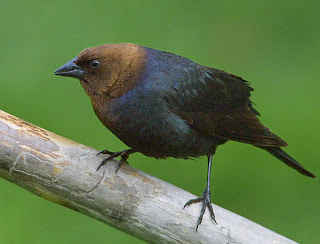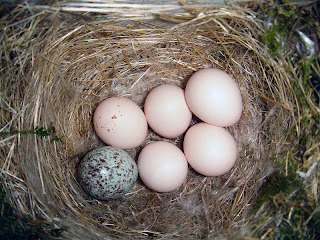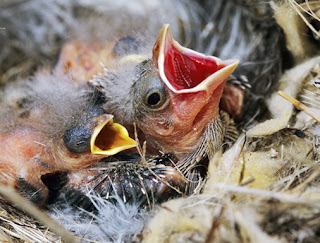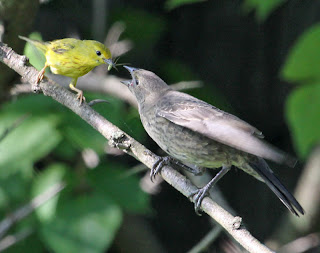Birds work their fannies off. That’s why you hardly ever see a proper fanny on a bird. Especially during nesting season, they’re up at the crack of dawn and spend the whole day going about the business of raising a family. There’s nest construction, and defense, and music performance anxiety, and feeding their young. It’s not easy.
Unless you’re a cowbird.
Cowbirds are among the animals collectively referred to as “brood parasites,” and they’ve figured out how to rig the system. Cowbirds roll out of bed when they feel like it and have sex with, you know, anyone, as long as it’s probably another cowbird, and then the females go lay an egg in someone else’s nest–someone who may have been working on that particular nest for a long time and had it just so. The cowbird egg may be bigger or more speckled or otherwise different from the eggs of the nest proprietor, and yet that proprietor will often incubate all the eggs, and then feed the cowbird when it hatches. Furthermore, the cowbird generally hatches first and starts kicking out the other eggs. The cowbird nestling is a giant mouth on bird legs. Any surviving original hatchlings wither in eclipse under its gaping maw, and the parent birds run themselves ragged trying to fill it up. The cowbirds prosper at the expense of the hard-working host birds, and their success depends on the host birds not noticing.
It’s hard to imagine how a little mama warbler would mistake this pituitary case for one of its own, but sometimes things sneak up on you in life, especially if you’re busy, and you can find yourself in a situation without knowing how you got there. Especially if it’s all you can do to fend for yourself and your family. Even among humans, it’s not uncommon to trudge through your work-a-day world and suddenly wake up in mid-life and discover you have a gigantic, speckled ass. And divorce is too expensive.
Or, it could be that the host bird is just programmed to be nice. I haven’t forgotten the time Dave came home from the tavern towing a pert young blonde and said, just before falling into a fast, flatulent sleep, “this is Denise. Talk to her. She’s been hitchhiking up I-5 from California and she thinks she’ll be safe because she has an angel on her shoulder.”
So I talked to little Denise and informed her she wasn’t going anywhere, she was staying right here with us until she found a safe place to live and renounced her invisible angel, and that was that. And that was that. She stayed for a few days, then a few more days, and on into months, eating my food, wearing my clothes, wrecking my bike, periodically offering to whip up some “peanut butter and spices on crackers,” all the while keeping up a bright soprano patter of thought-free conversation until we had to kill her, with no angelic intervention, and it was a tremendous waste of effort and resources, although the new concrete patio was nice.
At any rate, this situation obviously benefits the cowbirds, who are free to go about hoovering bugs to their big fat hearts’ content, since they don’t have to do any of the work of maintaining a domicile and child-rearing. It is of no benefit at all to the host birds. Why do they let such a thing happen? Well, cowbirds are stealthy.
They scout out host nests while they’re being constructed, and squat in them when they know the nest builders are hard at work collecting materials. The day before they plan to drop an egg, they’ll come by and kick out one of the host eggs. They plant one of their own in among the others. Then they quit making payments into the host birds’ pension funds and tell them they’re better off investing their own money, even though they aren’t. Meanwhile they raid the pension funds for executive bonuses, and finally they explain the whole defined-benefit pension fund thing is not sustainable, what with their raiding and all, and go after the union birds’ pensions too, because their success is ruining their narrative.
They lay a lot of eggs and deposit one each in nests all over the territory, taking advantage of the new lenient bankruptcy laws to restructure corporations, and use the Net Operating Loss Deduction to avoid any taxes at all, while allowing them to borrow money to raid other nests and close some down and sell off the assets, thus transferring all the risk from stockholders to individual taxpayers. Then tax reform encourages them to move factories abroad and escape federal income tax. By the time they pressure Congress to repeal the Glass Seagull Act, there is nothing to stop the cowbird from getting fatter and fatter at the expense of the host birds’ own nestlings. The cowbird profits handsomely no matter what befalls the birds that work so hard on their behalf.
You have to wonder if such a scheme is sustainable, of course. If the host birds cannot learn to recognize a fat cowbird squatting in their own nests, they may not survive, and the cowbirds will no longer be able to profit from all of their work. And some species have indeed learned to defend themselves against the cowbirds. What the cowbird does, however, is plant eggs widely and indiscriminately. The American brown-headed cowbird has been observed to parasitize the nests of 220 species. Even if the whole operation falls apart some day, they’ll have had a mighty nice run.




And didn't you sneak your message in there with all the stealth and skill of a cowbird…but you're prettier and more likeable.
I knew there had to be a profound parallel in this post when I started reading it. I started thinking about Washington and the economic establishment of this country about two paragraphs into your discussion. It is frightening how the human condition is so like nature. Hubby always tells me that the movie Aliens has parallels in nature. I salute your insight. This is a great analysis and I'm sure you could entertain us for weeks with wonderful stories about the oddities of nature. Sounds like a book theme. I envy your students–your classes must have been quite an experience.
The big problem is that the cowbirds (or their counterparts) have gained so much power that they will continue wearing away at the hard-working birds unless they're stopped. After all, what's a few more dead birds?
Cowbird Economics. Now that is the course I should have signed up for. At least I could've understood it.
I knew cowbirds were maligned, since I never knew this about them. I wonder if they would mind coming over and messing with some of the local house sparrow nests, as those birds are awfully prolific. You don't usually see parallels of greed and dishonesty in nature… it's usually reserved for the larger species seen in Congressional circles. Great analysis! Loved it.
You've found the best possible analogy for the parasitic "financial profession."
A cowbird left a big old speckled egg in a sweet bluebird clutch in our box. I snatched it up and skipped that sucker straight into the lake. THEN, I wrote the Clemson bird expert and asked what I should do. He said I couldn't destroy the egg because it was illegal. Ex-cayuse me?!
Excellent post. Your analogy is spot on.
You, my dear, are freaking brilliant! Now, what happens if we exterminate all the cowbirds? Will some other parasite fill the environmental niche? Get rid of the parasitic aristocrats and before you know it, the CEOs have moved in.
Brilliant!
Nice analogy Murr! I watch the cowbirds around the farm and I know what they do, yet I am powerless to stop more than a few as the nests are inaccessible to me. It's very frustrating.
I love you, Murr Brewster!
This is one of the most interesting analogies that I've read in a while. Your blog is quickly becoming one of my favourites…I never know what to expect from you, and I always find myself deep in thought after reading.
(And also, this reminded me of John Wyndham's The Midwich Cuckoos. So it could be an analogy for both a parasitic financial institution AND a secret extraterrestrial invasion. Doubly brilliant. Ha!)
so what happened to Denise? How did you get rid of her? Can't imagine allowing a hitch hiker stay in my home for months.
What I will never understand is why so many of the host birds think the parasitic cowbirds are doing them a damn favor. Stop voting for the cowbirds, people!
Another stroke of genius…
Hey R.J.–I wish I'd had students. I never even considered being a teacher, but I think I would have liked it.
Nance: you have a lake? Whoa! Maybe one of my birding buddies will chime in on what to do about cowbird eggs.
A lake…a pond…a fitting repository for cowbird eggs…close enough.
Occupy The Nest.
"Glass Seagull" very good, Murr.
Beautifully said and presented!!!!
Birdy friend pitches in: Skip that egg like a stone, just don't tell anyone. Quoting from http://www.sialis.org/cowbirds.htm (which has some excellent information and awful pictures of a cowbird nestling starving out a bunch of sweet baby Carolina wrens:
"Like it or not, Cowbirds are native, so they are protected under the Migratory Bird Treaty Act. This means that in most cases, eggs cannot be removed from nests without a permit. Special permits have been obtained to kill Cowbirds that congregate in enormous flocks and are considered a nuisance. In some spots in states like MI and TX, permits can be obtained to trap Cowbirds to protect endangered species like Kirtland's Warblers. In some areas, bluebird box monitors are authorized to remove eggs and trap adults after taking a class. Check on local requirements."
It varies state by state, but Texas, for instance, has a Parks and Wildlife Code, Section 64.002 (b), stating that
" brown-headed cowbirds are included among the small group of eight non-protected bird species that may be killed at any time and their nests or eggs may be destroyed."
Not sure what the other seven are. Likely European starling and house sparrow are on the baddy list, too.
Once again, you take the art of the blogpost well outside the expected envelope, Murre. I don't know about anyone else but I'm scratching my head over the blonde. Just how much of that happened?
xoxo
jz
I hate cowbirds. I hate what they do, how they act and the destruction they cause to other species. Metaphoric or otherwise. Good post, Murr. Oh, and I'd hurl that egg at a tree and not tell a soul.
Fantastico!!!
Thanks for the input, Julie, and I hope they won't come after you! About the blonde. Just about all of it happened, but the patio didn't arrive until enough years A.D. (After Denise) that it barely arouses suspicion.
Favorite children's book author from childhood, Thornton W. Burgess, chose the name Sally Sly for the Brown-headed cowbird in his stories back in the 1920s. Spot on, I'd say.
god you are talented.
Methinks the American brown-headed cowbird has been the role model for certain members of our society.
Murr, nice riff on the Occupy movement!
Aha! So the cowbirds are part of the 1%!
Who knew that in that "bird brain" there was a thoroughly political, warmongering mind? Oh, how true the parallels! Only with your political and analytical mind could the line between the birds and the mortgage muckers be so clearly drawn.
This is one of our finest. Except for the one before that. and the one last year, where you…
May the holidays gift you with even more insights into the workings of the cowbirds of politics!
I know some cowbirds. Does your patio need an extension???
Ar ar ar!
my youngest cowbird is coming home to stay while he looks for work. ar ar ar…cough, wheeze
Shame about Denise…I'm wondering if some cowbird dropped off some of these kids I have living with me…sigh…
So cowbirds are the Republican equivalent in birddom. I get it.
Ha ha, nicely done! Unlike RJ, I didn't see the parallel coming, and the moment I realized what you were doing was truly delightful.
I was puzzled one day about the identity of a large obviously immature bird. Then two house sparrows arrived, began feeding the gargantua and its identity became clear; cowbird. And I am all in favor of cowbirds parasitizing house sparrows. It was ludicrous that the combined size of the two foster parents was about equal to the size of their fosterling.